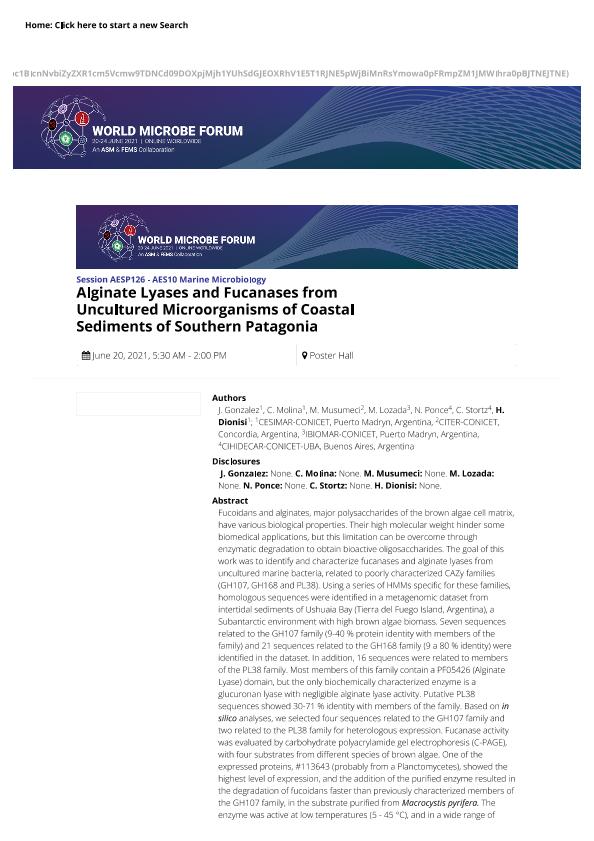Evento
Alginate Lyases and Fucanases from Uncultured Microorganisms of Coastal Sediments of Southern Patagonia
Gonzalez, Jessica Alejandra ; Molina, Celeste Amancay Valeria
; Molina, Celeste Amancay Valeria ; Musumeci, Matias Alejandro
; Musumeci, Matias Alejandro ; Lozada, Mariana
; Lozada, Mariana ; Ponce, Nora Marta Andrea
; Ponce, Nora Marta Andrea ; Stortz, Carlos Arturo
; Stortz, Carlos Arturo ; Dionisi, Hebe Monica
; Dionisi, Hebe Monica
 ; Molina, Celeste Amancay Valeria
; Molina, Celeste Amancay Valeria ; Musumeci, Matias Alejandro
; Musumeci, Matias Alejandro ; Lozada, Mariana
; Lozada, Mariana ; Ponce, Nora Marta Andrea
; Ponce, Nora Marta Andrea ; Stortz, Carlos Arturo
; Stortz, Carlos Arturo ; Dionisi, Hebe Monica
; Dionisi, Hebe Monica
Tipo del evento:
Otro
Nombre del evento:
World Microbe Forum
Fecha del evento:
20/06/2021
Institución Organizadora:
American Society for Microbiology;
Federation of European Microbiological Societies;
Título del Libro:
World Microbe Forum
Editorial:
American Society for Microbiology
Idioma:
Inglés
Clasificación temática:
Resumen
Fucoidans and alginates, major polysaccharides of the brown algae cell matrix, have various biological properties. Their high molecular weight hinder some biomedical applications, but this limitation can be overcome through enzymatic degradation to obtain bioactive oligosaccharides. The goal of this work was to identify and characterize fucanases and alginate lyases from uncultured marine bacteria, related to poorly characterized CAZy families (GH107, GH168 and PL38). Using a series of HMMs specific for these families, homologous sequences were identified in a metagenomic dataset from intertidal sediments of Ushuaia Bay (Tierra del Fuego Island, Argentina), a Subantarctic environment with high brown algae biomass. Seven sequences related to the GH107 family (9-40 % protein identity with members of the family) and 21 sequences related to the GH168 family (9 a 80 % identity) were identified in the dataset. In addition, 16 sequences were related to members of the PL38 family. Most members of this family contain a PF05426 (Alginate Lyase) domain, but the only biochemically characterized enzyme is a glucuronan lyase with negligible alginate lyase activity. Putative PL38 sequences showed 30-71 % identity with members of the family. Based on in silico analyses, we selected four sequences related to the GH107 family and two related to the PL38 family for heterologous expression. Fucanase activity was evaluated by carbohydrate polyacrylamide gel electrophoresis (C-PAGE), with four substrates from different species of brown algae. One of the expressed proteins, #113643 (probably from a Planctomycetes), showed the highest level of expression, and the addition of the purified enzyme resulted in the degradation of fucoidans faster than previously characterized members of the GH107 family, in the substrate purified from Macrocystis pyrifera. The enzyme was active at low temperatures (5 - 45 °C), and in a wide range of salinity concentrations (9.5 - 861 mM NaCl) and pH values (4.5 - 9). Alginate lyase activity was measured by following the increase in Abs235nm. Proteins #216008 (Gammaproteobacteria) and #149193 (Bacteroidetes) also showed high expression levels and both enzymes displayed alginate lyase activity, adding a new activity to the PL38 family. This study increases the current knowledge on fucoidan and alginate degradation potential in microbial communities from Subantarctic sediments, and describes novel enzymes from bacteria of an extreme environment for brown algae biomass utilization. JG and CM contributed equally to the work.
Palabras clave:
ENZIMAS MARINAS
,
OLIGOSACARIDOS
,
ORGANISMOS NO CULTIVADOS
Archivos asociados
Licencia
Identificadores
Colecciones
Eventos(CESIMAR)
Eventos de CENTRO PARA EL ESTUDIO DE SISTEMAS MARINOS
Eventos de CENTRO PARA EL ESTUDIO DE SISTEMAS MARINOS
Eventos(CIHIDECAR)
Eventos de CENTRO DE INVESTIGACIONES EN HIDRATOS DE CARBONO
Eventos de CENTRO DE INVESTIGACIONES EN HIDRATOS DE CARBONO
Eventos(IBIOMAR)
Eventos de INSTITUTO DE BIOLOGIA DE ORGANISMOS MARINOS
Eventos de INSTITUTO DE BIOLOGIA DE ORGANISMOS MARINOS
Citación
Alginate Lyases and Fucanases from Uncultured Microorganisms of Coastal Sediments of Southern Patagonia; World Microbe Forum; Washington; Estados Unidos; 2021; 1-2
Compartir



